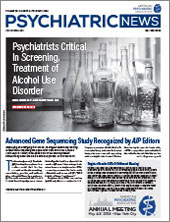Have you ever tried to get eight hours of tranquil sleep while contending with constant threats to your physical safety or the possibility of having your belongings stolen?
Every psychiatrist knows about the importance of good sleep, so I ask all my patients about their sleep patterns. Disrupted circadian rhythm contributes to decompensations in almost every mental illness. Inadequate sleep increases cortisol levels, which makes patients more irritable, anxious, dysphoric, manic, and even delirious. I provide information on behavioral modifications and prescribe medications to make sleep more restful. For patients without a permanent place to call home, my efforts fall short, as the unpredictability of homelessness makes it hard to form a “normal sleep routine” (for example, going to sleep at the same time every night, putting away electronics before bed, and participating in quiet activities to promote sleepiness). For patients with substance use disorders and homelessness, it is difficult to stay away from drug paraphernalia and other triggers for usage.
To achieve the APA Foundation’s goal of a mentally healthy nation, we need to do our part to ensure that every person is safely housed. In Charlottesville, Va., alone, where I live, there has been about a 40% increase in homeless individuals from 2020 to 2022. Homeless individuals include the number of people who are in emergency shelters, transitional housing, or unsheltered on a given day, according to the
Blue Ridge Area Coalition for the Homeless.
If you want to do your part in addressing homelessness and provide meaningful support to homeless individuals, here are some helpful advocacy points to address at the local and state levels:
•
Advocate against local and state-managed curfews. Stringent curfews force people in homelessness to seek shelter, but in cities that do not have capacity to shelter people for the night, this increases the risk of unsheltered people being incarcerated. Criminal charges may make it even more difficult to obtain permanent, safe housing in the future.
•
Support housing-first programs. Numerous institutions have argued that housing is a human right. Providing housing without requiring potential tenants to “work a program” and prove themselves “worthy of housing” is not only the right thing to do but it is also cost-effective—for example, it decreases the number of emergency room visits and hospitalizations and the burden on the criminal justice system. After obtaining secure housing, people are able to make incremental changes toward getting a job, obtaining an education, or participating in substance use treatment programs. As mental health professionals have witnessed firsthand, people who voluntarily engage in mental health services without mandates are more likely to stay in treatment.
•
Support expansion of the Housing Choice Voucher Program, Mainstream Vouchers, and project-based rental assistance programs. The Housing Choice Voucher Program provides financial assistance for families in the private market, whereas Mainstream Vouchers provide financial assistance to families whose head of household, spouse, or sole inhabitant is a person with disabilities. Project-based rental programs provide financial assistance for inhabitants of privately owned rental units, but once inhabitants move, the rental assistance does not follow them. While these housing vouchers may be life-changing, it can take years on a waiting list to quality for one.
I am treating a single mother who is 240-something on the waiting list for a Housing Choice Voucher for herself and her daughter. She left her old apartment unit due to possible predatory rental practices, which made it difficult to afford other basic necessities. Medication and psychotherapy cannot alleviate this social determinant of health. To have a mentally healthy nation, we must treat housing as a right itself. ■

